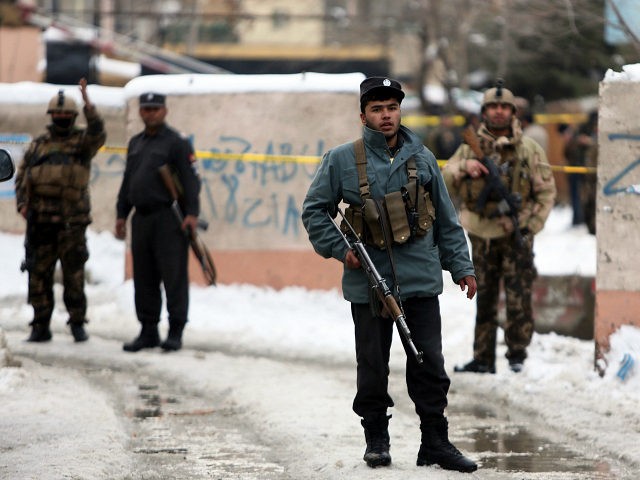The Islamic State (ISIS/ISIL) branch in the Afghanistan-Pakistan region has taken credit for a suicide bombing outside the Supreme Court in the Afghan capital of Kabul that left at least 20 people dead and dozens of others wounded, a testament to the jihadist group’s growing influence and the dangerous threat it presents.
ISIS, considered a rival by the Taliban, identified the suicide bomber as Abu Bakr Altajiki from Afghanistan’s neighbor Tajikistan, reports SITE Intelligence group which monitors jihadi activity online.
IS’ Khorasan Province Claims Suicide Bombing by Tajik Fighter Outside Supreme Court in Kabul https://t.co/vXvOJ92Etn
— SITE Intel Group (@siteintelgroup) February 8, 2017
The claim of responsibility for Tuesday’s suicide attack in Kabul comes as Voice of America (VOA) reports that authorities in the northern Afghan province of Jowzjan have accused ISIS jihadists of executing at least six local employees of the International Committee of the Red Cross (ICRC) and kidnapping two others.
VOA notes, “The Taliban has denied involvement in the incident, saying attacking ICRC is a crime.”
“We will find and punish the offenders,” reportedly added a Taliban spokesman.
Tuesday’s deadly incident outside the Afghan Supreme Court was the second major ISIS attack in the Afghan capital.
In July 2016, ISIS triggered two explosions at a rally in Kabul organized by members of the minority Shiite Hazaras, killing at least 80 people and wounding 231 others. The attack has been deemed one of the deadliest assaults in the country’s capital since the Afghanistan war started in October 2001.
Known as the Khorasan Province (IS-KP/ISIL-K), the Islamic State offshoot in Afghanistan announced its presence in Afghanistan in January 2015, less than a month after former President Barack Obama announced the end of the U.S. combat mission and a major drawdown of American troops.
Eastern Afghanistan’s Nangarhar province, one of the major opium producing regions located on the country’s border with Pakistan, has been identified as ISIL-K’s major stronghold in the region. The cultivation and production of the illicit drug opium, used to make heroin, generates millions of dollars in revenue.
1) #ISIS claimed the suicide bombing outside Afghan Supreme Court in #Kabul, by Tajik fighter. https://t.co/s8EGVS0Q3t pic.twitter.com/mZ5nHqxcD2
— Rita Katz (@Rita_Katz) February 8, 2017
5) Situation in #Kabul & Afghanistan continues deteriorating amid rivalry. Tho Afghan #Taliban more powerful, #ISIS threat still looms
— Rita Katz (@Rita_Katz) February 8, 2017
Kabul has been primarily targeted by the Taliban, which remains the strongest terrorist group in Afghanistan.
However, Rita Katz, director of SITE, writes on Twitter, “Situation in #Kabul & Afghanistan continues deteriorating amid rivalry. Tho Afghan #Taliban more powerful, #ISIS threat still looms.”
The suicide attack on Tuesday left 21 people dead, including nine women, noted Wahidullah Mayar from the Afghan Health Ministry, adding that among the 41 people injured are nine other women and two children.
Tuesday’s deadly incident comes about a month after two suicide bombings carried out by Taliban jihadists killed at least 36 people and wounded dozens near the Afghan Parliament in Kabul.
According to a new report by the United Nations, civilian deaths hit a historic high last year.
The U.N. documented “11,418 conflict-related civilian casualties, including 3,498 killed and 7,920 injured.”
“Of these, 3,512 were children – 923 dead and 2,589 injured, up 24 per cent on the previous highest recorded figure,” adds the international body.
Anti-government forces, primarily the Taliban, are responsible for almost two-thirds of those casualties while pro-government forces were responsible for nearly one quarter.
The Afghan government only controls or influences about 60 percent of the country, according to the U.S. Special Inspector General for Afghanistan Reconstruction (SIGAR).
Since ISIL-K established a presence in Afghanistan, the terrorist group has been fighting against the Taliban for turf and influence.
In June 2016, both groups claimed responsibility for the same attack in Kabul that left 14 Nepalese nationals and injured several others.
ISIL-K’s influence in Afghanistan is growing and fueling the country’s deteriorating security condition, warned Russia, China, and Pakistan in December 2016, echoing the U.S. military.
U.S. and Afghan officials have accused Russia of providing assistance to the Taliban in its fight against ISIL-K.
Russia, China, and Pakistan have “noted the deterioration of the security situation [in Afghanistan],” declared Maria Zakharova, a spokesman for the Russian Foreign Ministry, adding that the three countries agreed on a “flexible approach to remove certain figures from sanctions lists as part of efforts to foster a peaceful dialogue between Kabul and the Taliban movement.”
Afghanistan’s neighbor Iran is also lending support to the Taliban, acknowledged Gen. John Nicholson, the top commander of U.S. and NATO forces in Afghanistan, last month. The Shiite country is believed to be backing the terrorist group in its fight against ISIL-K.
Khorasan is a name that refers to a region that covers parts of Afghanistan, Pakistan, Iran, India, and other surrounding countries.

COMMENTS
Please let us know if you're having issues with commenting.